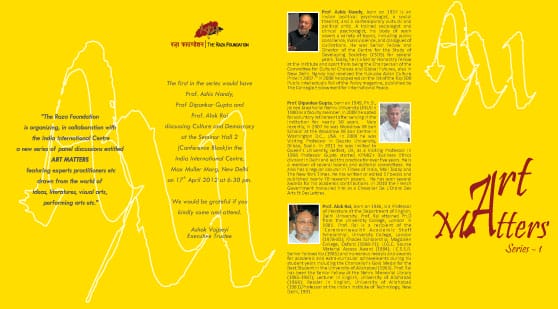
10-Apr-2012 12:00 AM
2382
The contemporary times stand witness to a constant deterioration of meaning of art and manipulation of theoretical social and political concepts as well as their practical significance. Whether they are questions as serious as social and political concerns of human rights or social exclusion affecting a dignified human survival, or as sensitive as the extinction of classical art forms, it calls for an urgent need to revisit and discuss prevalent conceptions.
Art has its unique way of reviving our soul from deadening monotonous routines through its multiple intricate expressions. Forming a singular perception of art or attributing a definitive meaning to it often reduces art from its fascinating complexity and expressive charm. This reductive approach confines art to its modernist understanding, which then fails to take cognizance of the artistic abstraction expressed through different forms and styles.
The Raza Foundation through its series ‘Art Matters’ provide a platform for open discussion on art in its endeavour to release the true essence of art from the clutches of definitive modernist approach in order to grasp myriad ways of extolling art. Well known, renowned scholars and practitioners from all the diverse fields of arts, dance, music, social science, poetry, and so on are invited for this purpose.
Here, we publish the first panel discussion of ‘Art Matters’, titled ‘Culture and Democracy’’ featuring Prof. Norman Davies, Prof. Alok Rai, Prof. Rajeev Bhargava, Prof. Ashis Nandy.
Norman Davies, born in 1939 in Bolton (Lancashire) was educated at Bolton School, Magdalen College, Oxford, and the University of Sussex and at several continental universities including Grenoble, Perugia and Kraków. His formative years created a lifelong European outlook. His special interest in Central and Eastern Europe was unusual among contemporaries. It started in 1958 when four school-leavers drove from Lancashire to Istanbul and back in an ex-US Army Jeep. It was consolidated by further adventurous travels: by intensive Russian courses and by post-doctoral study at the Jagiellonian University, where he obtained a Ph.D.
Prof. Alok Rai, Ex Faculty, Department of English, University of Delhi, born and bred in Allahabad, Prof. Alok Rai grew up in an affluent Hindi – Urdu environment which explains his strong linguistic background. He holds a graduate degree in modern English literature and became a Rhodes Scholar at Oxford. At, the University College of London, he had written a Ph.D. dissertation on George Orwell and later he has also published books on the said author while also writing on the formation of modern Hindi. As a translator his translation of Nirmala was published by Oxford University Press many years ago. He has been involved with the business of writing, with language in society. His interests include, Modern English Literature; cultural processes in modern North India, with particular reference to issues of language and literature. He is also the grandson of the legendary Hindi writer Premchand.
Rajeev Bhargava is Senior Fellow at the Centre for the Study of Developing Societies and the Director of its Programme of Social and Political Theory. He was formerly Professor at the Jawaharlal Nehru University and between 2001 and 2005, Professor of Political theory and Indian Political Thought and Head of the Department of Political Science, University of Delhi. His publications include Individualism in Social Science, (Clarendon Press, Oxford, 1992,) Secularism and its Critics ed. (OUP, New Delhi, 1998), Civil Society, Public Sphere and Citizenship (ed. with H. Reifeld, Sage, 2005).
Ashis Nandy is an Indian political psychologist, social theorist, and critic. A trained clinical psychologist, Nandy has provided theoretical critiques of European colonialism, development, modernity, secularism, Hindutva, science, technology, nuclearism, cosmopolitanism, and utopia. He has also offered alternative conceptions relating to cosmopolitanism and critical traditionalism. In addition to the above, Nandy has offered an original historical profile of India's commercial cinema as well as critiques of state and violence. He was Senior Fellow and Former Director of the Centre for the Study of Developing Societies (CSDS) for several years. Today, he is a Senior Honorary Fellow at the institute and apart from being the Chairperson of the Committee for Cultural Choices and Global Futures, also in New Delhi. Nandy had received the Fukuoka Asian Culture Prize in 2007. In 2008 he appeared on the list of the Top 100 Public Intellectuals Poll of the Foreign Policy magazine, published by The Carnegie Endowment for International Peace.
The event was organized at the Indian International Centre on April 17, 2012.